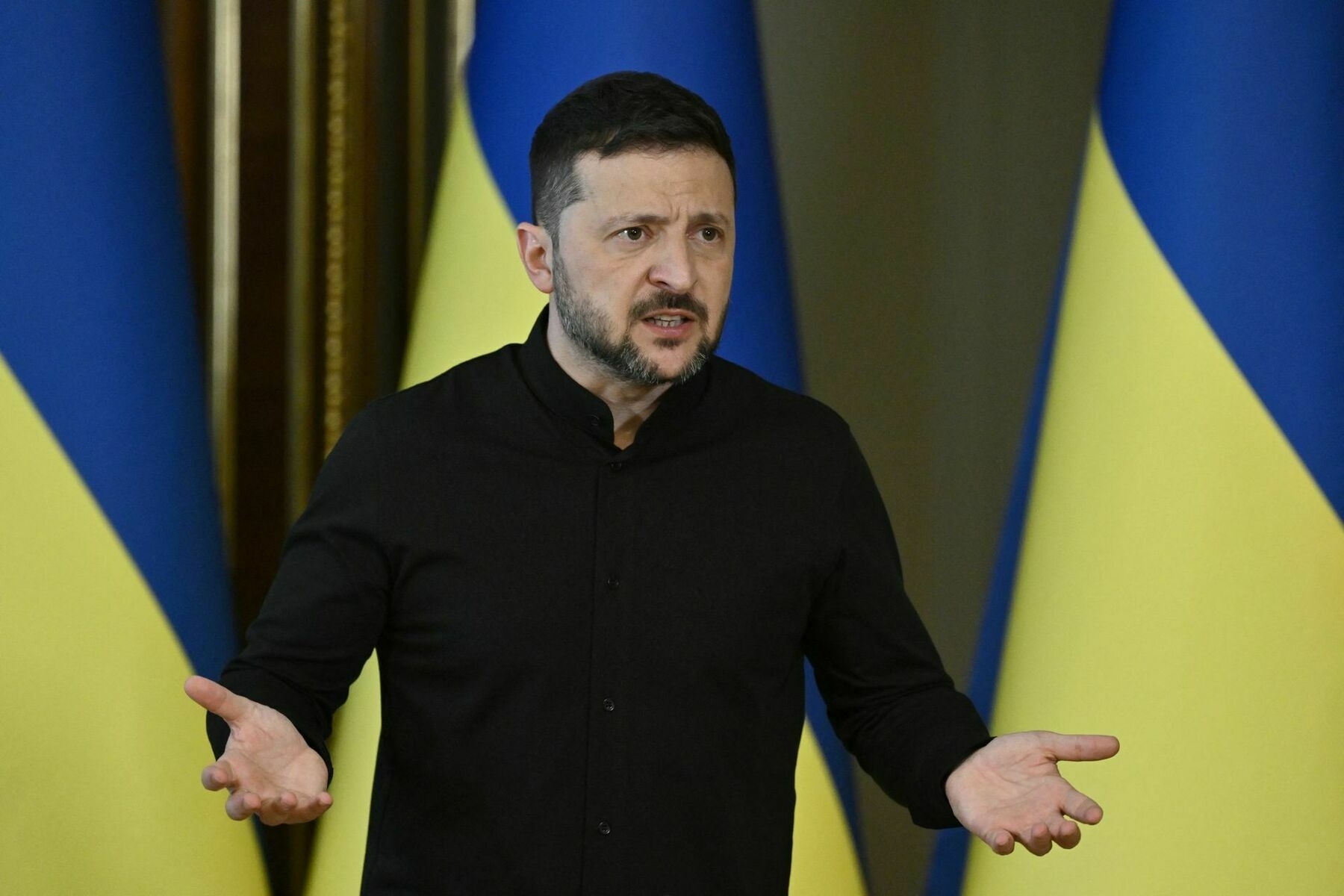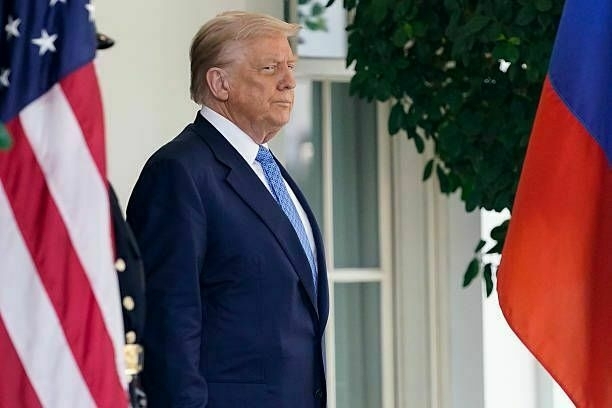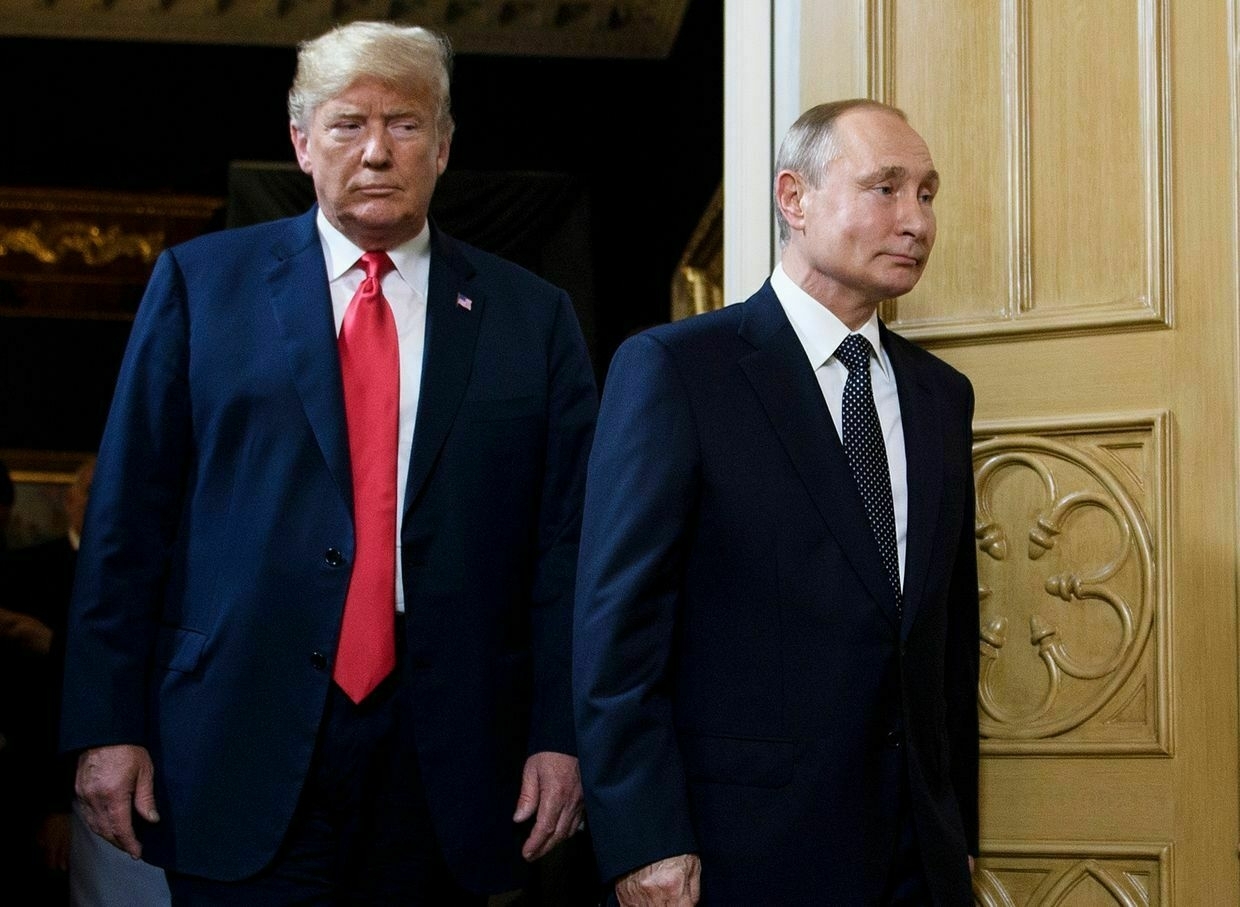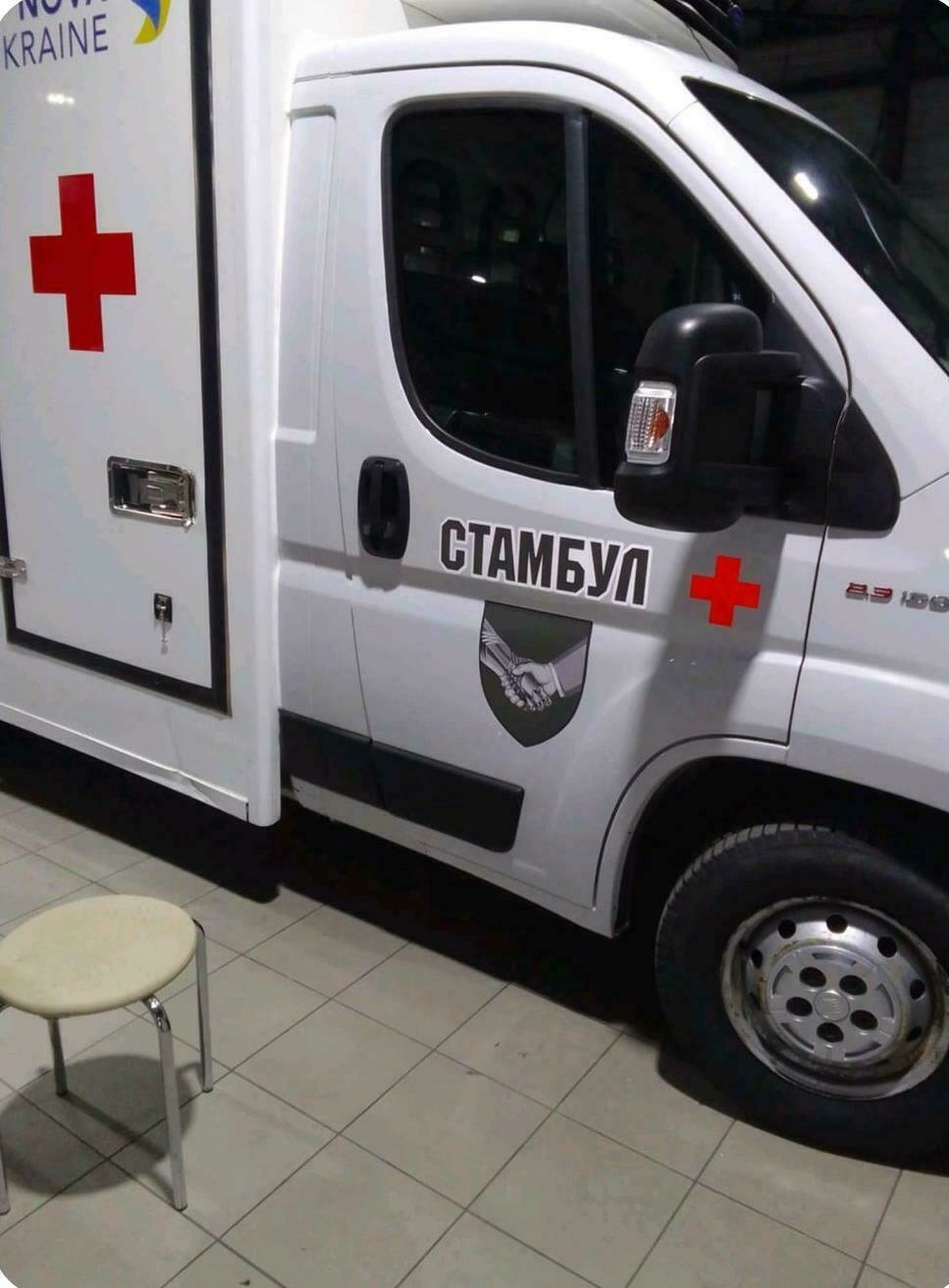-
IMPORTANT! Zelenskyy responds to upcoming Trump-Putin meeting: Real peace is needed
-
IMPORTANT! Zelenskyy responds to upcoming Trump-Putin meeting: Real peace is needed
-
'Ukrainians will not gift their land' — Zelensky rejects idea of territorial concessions to end Russia's war
-
'Ukrainians will not gift their land' — Zelensky rejects idea of territorial concessions to end Russia's war
-
URGENT! Zelenskyy on the meeting between TRUMP and PUTIN: There will be NO territorial concessions!
-
URGENT! Zelenskyy on the meeting between TRUMP and PUTIN: There will be NO territorial concessions!
-
Ukraine, allies set to meet in UK ahead of Trump-Putin summit, Axios reports
-
As ceasefire deadline passes, no additional Russia sanctions announced by Trump
-
Armenia, Azerbaijan sign peace deal at White House ceremony, plan to nominate Trump for Nobel Peace Prize
“For more than 35 years, Armenia and Azerbaijan have fought a bitter conflict that resulted in tremendous suffering for both nations… Many tried to find a resolution… and they were unsuccessful. With this accord, we’ve finally succeeded in making peace,” U.S. President Donald Trump said.
-
NEWSFLASH: Putin, Trump to meet face to face next week
Editor’s Note:
We continue working despite constant nightly shelling by the Russians.
We provide comprehensive reporting on Ukraine, covering all key events in a timely and accurate manner.
Want to stay up to date with the latest news? Upgrade your subscription!
U.S. President Donald Trump will meet Russian President Vladimir Putin in Alaska next Friday — marking a break from the diplomatic isolation Putin has faced from NATO and other Western nations.
“The highly anticipated meeting between myself, as President of the United States of America, and President Vladimir Putin, of Russia, will take place next Friday, August 15, 2025, in the Great State of Alaska. Further details to follow. Thank you for your attention to this matter!” Trump wrote on his Truth Social account on Friday evening.
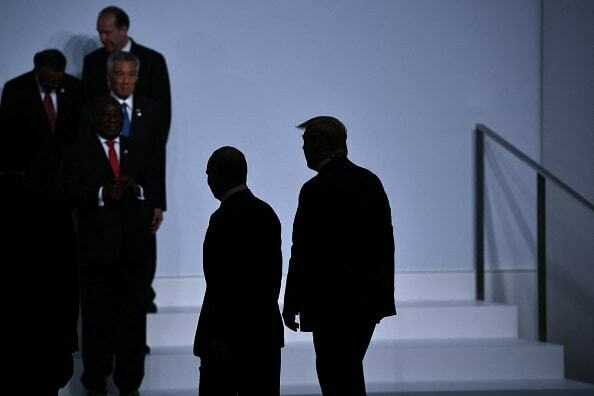
Russia's President Vladimir Putin (L) and US President Donald Trump (R) arrive for a family photo session at the G20 Summit in Osaka on June 28, 2019. (Photo by Brendan Smialowski / AFP) (Photo by BRENDAN SMIALOWSKI/AFP via Getty Images). After the paywall:
What led to the meeting between Trump and Putin;
Why is this meeting considered a win for Russia;
What is Russia expected to ask in exchange for a ceasefire.
-
China vows to continue buying Russian oil amid Trump's tariff threats
“It is legitimate and lawful for China to conduct normal economic, trade and energy cooperation with all countries around the world, including Russia,” China’s Foreign Ministry said in response to question about Russian oil purchases posed by Bloomberg. “We will continue to adopt reasonable energy security measures in accordance with our national interests."
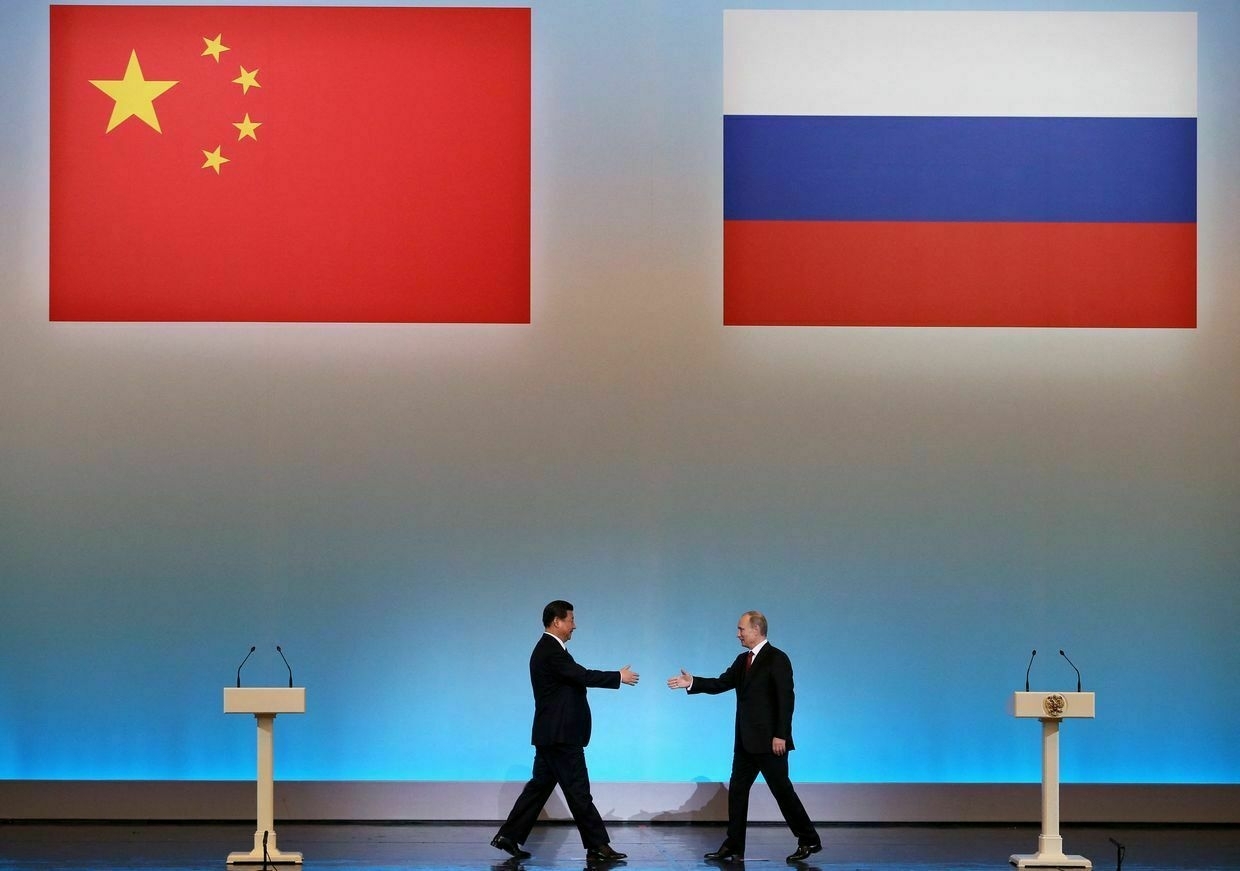
-
Breaking: Trump, Putin to meet in Alaska on Aug. 15 for peace talks
“The highly anticipated meeting between myself, as President of the United States of America, and President Vladimir Putin, of Russia, will take place next Friday, August 15, 2025, in the Great State of Alaska,” Trump wrote on Truth Social, adding that “further details will follow."
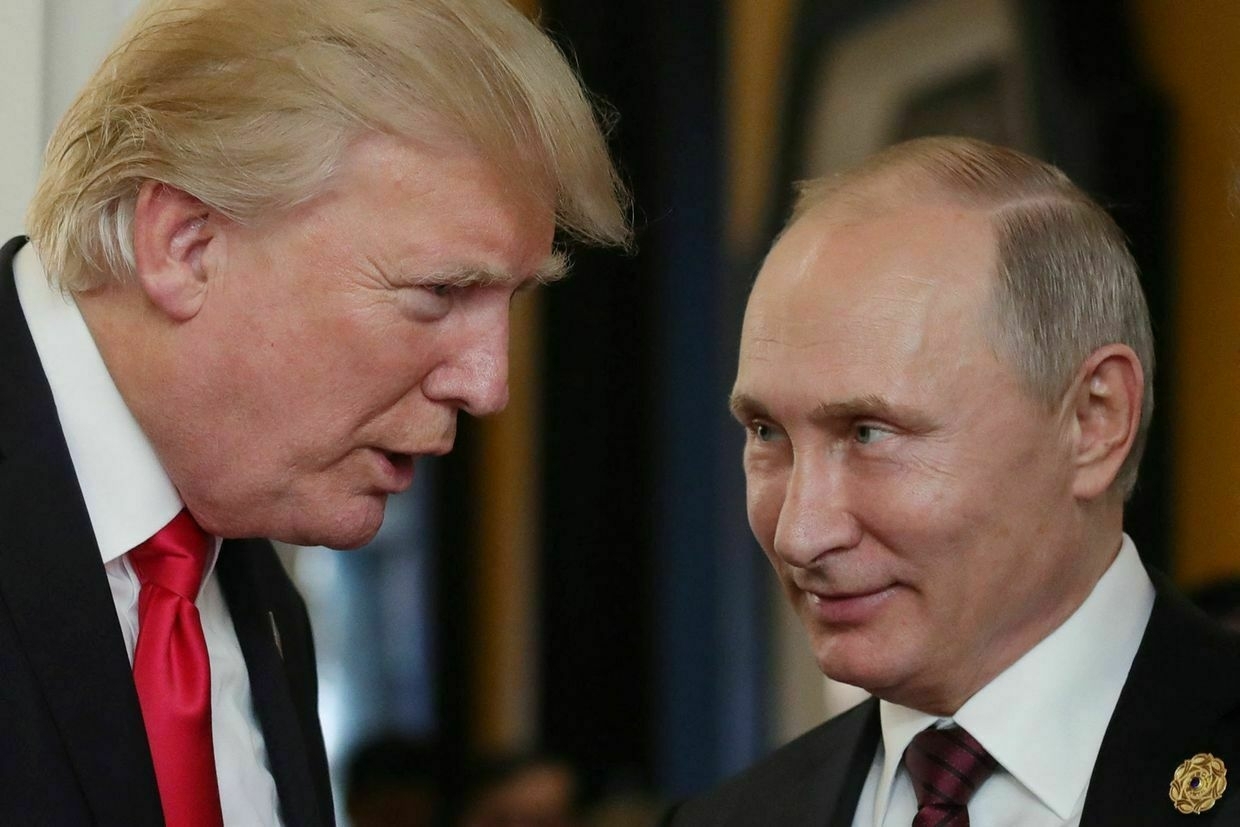
-
TRUMP announces meeting with PUTIN! Peace deal soon? #shorts
-
Peace talks will include 'some swapping of territories,' Trump says ahead of proposed meeting with Putin
-
Trump-Putin meeting tentatively scheduled for end of next week, NBC News reports
-
Russia launches massive drone attack on Ukraine as Trump’s ceasefire ultimatum expires
On the day a ceasefire ultimatum set by U.S. President Donald Trump for his Russian counterpart Vladimir Putin was due to expire, Russia launched a massive drone assault on Ukraine.
According to the Ukrainian Air Force, the overnight attack on Friday, August 8, involved more than 100 aerial weapons, including 104 Shahed strike drones, various types of simulator drones, and 8 high-speed (jet-powered) drones.
The attacks reportedly were launched from Shatalovo in the Smolensk region, as well as from Kursk, Bryansk, Primorsko-Akhtarsk in the Krasnodar Territory, and the annexed Crimea, according to Ukrainian military statements.
Ukrainian forces successfully intercepted or suppressed 82 of these Russian drones across the north, south, east, and center of the country, including three jet-powered and 79 Shahed and other simulator drones. " 26 UAV strikes were recorded in 10 locations, with debris fall noted in 8 locations," reported the Ukrainian military.
One of the targets of the Russian assault was civilian infrastructure in Bucha, Kyiv region. The town's mayor, Anatoliy Fedoruk, reported damage to a kindergarten and seven private homes. He praised the effective work of the air defense forces for taking down most of the attacking drones, and noted that some structures are in need of repair.
"The important thing is that everyone is alive," Fedoruk remarked. He revealed during a news telethon that Bucha was targeted by 10 strike drones.
Separately, the head of the Kyiv Regional Military Administration, Mykola Kalashnyk, reported that three individuals—a 16-year-old girl and two women aged 56 and 80—underwent severe stress reactions due to the Russian attack.
"In the Buchansk district, 21 private houses, outbuildings, garages, two unfinished apartment buildings, and 10 cars were damaged," he wrote on Telegram.
The Russian assault also caused destruction in the Sumy region. Non-residential buildings, a store, and a vehicle were hit in the Sumy community, with a 54-year-old man injured, according to regional head Oleg Grigorov.
In Shostka, strikes from three drones damaged several multi-story buildings, cars, and social infrastructure, Grigorov noted.
Russian drones also targeted Kharkiv, causing a fire at a civilian facility in the Saltivskyi district, the city’s mayor Ihor Terekhov reported.
Simultaneously, drones struck the Odessa region. A sewage pumping station in the Odesskiy district was damaged, stated regional head Oleg Kiper. Additionally, an explosion at a gas station wounded a security guard, leaving him with multiple lacerations on his arm, according to Kiper.
-
Trump vs Putin: Ultimatum expired, Kremlin silent! Ukrainian strikes on military infrastructure
-
Kostia’s last trip.
Editor’s Note: Many members of our team have lost someone from their circle because of the war in Ukraine.
This is the reality for everyone living in a war zone — they carry within them the memory of those who are no longer with us. And our mission is to keep telling you the stories of incredible people: those who stand up to authoritarianism,
and those we can only bring back to life through words.
Support our work so that we never forget those who gave their lives for freedom.
Childhood friends Kostia and Valik have been planning to hitchhike from Ukraine to Cape Roca, Portugal — the westernmost point of Europe — since 2021.
Kostia finally managed to reach the Cape in 2024.
There were some adjustments to the plan, of course, as there often is when traveling. He did it in the company of his mother and aunt, rather than his friend. And instead of transiting their planned route via hitchhiking, they did it by bus.
But most importantly, Kostia wasn’t fully Kostia anymore.
His mother, Olga, scattered his ashes at Cape Roca and in the Boca do Inferno cave during this trip, a few months after he was killed by Russian forces.
Kostia ‘Istanbul’ Yuzviuk died in July 2024 after getting injured by a cluster bomb during a combat mission. He was evacuated to the hospital where his legs were amputated. But his injuries were too severe: his heart stopped.
After his death, his loved ones memorialized him by bringing his remains to more than 15 countries he had on his bucket list – one last final journey.
There’s been too much death in this war. But how we remember is a reflection of how those left behind seek to live.
This generation is trying to break free from the Soviet era, in which commemorative practices were stunted, considered a sort of individualism antithetical to the communist collective. Memorials were prioritized for what they considered heroes of the nation, instead of regular individuals. These memorials were impersonal; they glorified the state over any personal tragedies behind the deaths.

Photo of a Soviet monument dedicated to the heroic defenders in Kamianske. Photo from Wikipedia. The old Soviet commemoration tradition depicted its heroes in a grand way, but it created standoff distance. They were so idealized and perfected that people struggled to connect with and relate to them.
Now, Ukrainians are not losing distant heroes; they are losing loved ones, and they want to memorialize them in a manner befitting the individual dignity that is the cornerstone of democracy.
Since the war began, Ukrainians have gotten used to waking up to the cruel news that a loved one had died. This is what happened to Kostia’s family a year ago. Since then, they began to find ways to commemorate him in the way he would have most liked.
Kostia ‘Istanbul’ Yuzviuk was a Ukrainian soldier, activist, and vegan — a beloved friend, son, and brother who inspired those around him. Known among friends as “the best Ukrainian,” he stood out for his sincerity, perseverance, and lifelong dedication to social and political causes.
He went by the call sign ‘Istanbul’ because an ancient name of the city, Constantinople, sounds similar to Kostia.
Kostia wrote his will in the fall of 2022. So when he died, his friends followed his last wish as much as they could.
Several hundred people drove from different cities in Ukraine to say their final goodbyes to Kostia. The ceremony took place at the main square of Kostia’s hometown, Rivne. Everybody wore traditional Ukrainian clothing, which included Vyshyvanka shirts or military uniforms.
If it wasn’t for the coffin located at the centre or the tears in people’s eyes, one could have thought it was a celebration of Ukraine.
As Kostia wrote in his will: “If you want to come and spend some time, take some white kvass [Kostia’s favorite non-alcoholic beverage] and go somewhere to the shore/mountain/sunset, and you can talk alone, I'll listen to you with my kvass.”
So white kvass was given to every guest. In addition, almost every person there did 23 push-ups to commemorate Kostia, as he had been 23 years old.
Later that evening, there was an auction to raise funds for Ukraine’s Armed Forces, where vegan food was served. He even asked in his will to make some jokes about that:
“Make a few memes like ‘He died because he didn't eat meat’ or ‘If he had eaten meat jelly, he would have survived.’ Relatives will appreciate it.”
In the two weeks after his death, they have raised more than 2 million hryvnia, equivalent to $48,000 USD.
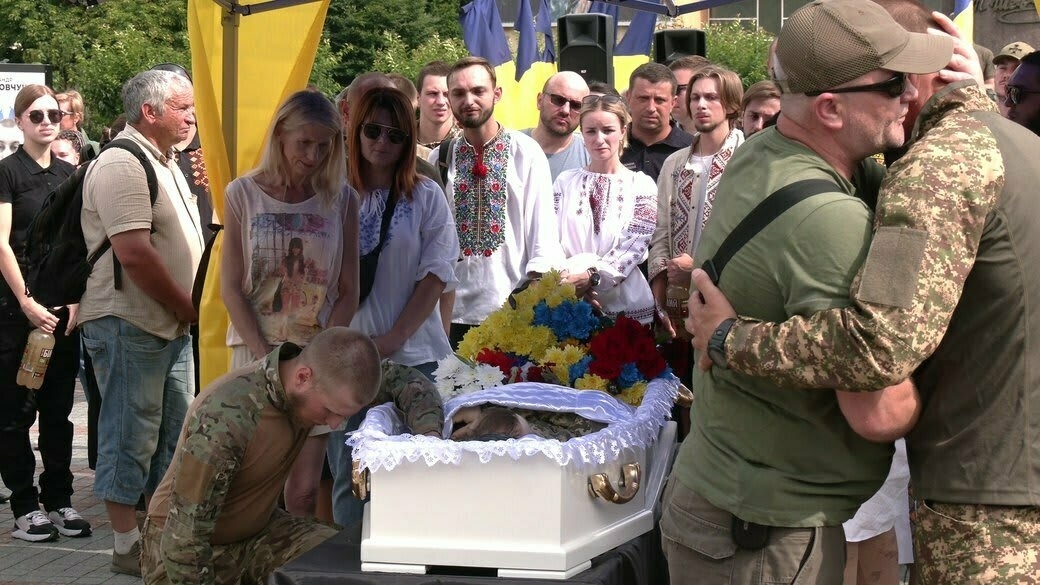
Kostіa’s funeral. Photo by Suspilne Rivne. The goal of commemoration is to tell the story of the person who is no longer with us. Instead of setting up bronze monuments, relatives find ways to illustrate the unique character of the deceased: interests, hobbies, dreams and struggles.
An example is the story of a bookstore in Vinnytsia, located in central Ukraine, that opened in commemoration of Mykola Rachok, a journalist who died fighting in the war. One of his dreams was to open his bookshop.

The bookstore ‘Heroii’ (In English, ‘Heroes’) opened in commemoration of Mykola Rachok in Vinnytsia. Photo: chytomo.com Victoria Zamchenko, a sommelier at the Goodwine chain of alcohol stores, was pregnant when she and her husband were killed by a drone attack in their Kyiv apartment on October 17th.
Months later, Goodwine and Ukrainian winemaker Serhii Stakhovsky planted a wine grape to pay their respects to Victoria. When the first harvest takes place in 2028, all the proceeds from the sales will be sent to the Victoria Fund, which helps young Ukrainian families.

A vineyard in commemoration of killed sommelier Victoria Zamchenko. Photo: victoria.goodwine.ua Campaigns have become a common way to remember the deceased during the war. In August 2023, on the Day of Remembrance of the Fallen Defenders of Ukraine, about 100 cafes and restaurants in Ukraine set one table aside to be decorated with sunflowers. Each visitor could then write on a card the name of a loved one who had passed away.
The campaign is called ‘Table of Remembrance’ and it has become a tradition in Ukrainian culture. Last year, more than 1,000 restaurants and cafes joined the initiative.

A table reserved for fallen soldiers in one of Lviv's cafes, August 29, 2024. Photo by Suspilne Lviv/Ivanka Dusko. All of these commemoration styles have the same goal: to show people that the entire Ukrainian society is standing by them in their grief.
“It is an opportunity to show each other that we care and that we do not want to turn away from other people's pain,” curator of the culture of memory platform ‘Past / Future / Art’ Oksana Dovgopolova said. “It allows us, as a society, to generate resources to endure this pain, to heal these wounds, to move forward.”
Olga, Kostia’s mother, still remembers July 18, 2024. She rushed to Zaporizhzhia to see her wounded child. But she was too late. Her grief grew when she recalled that her son had asked in his will to be cremated.
"When Sasha (Kostia's girlfriend) told me that Kostia wanted to be cremated. I started hysterically screaming, ‘Leave me my child, I want to bury him so that I have a place to come and talk to him,” she told The Counteroffensive.

Part of Kostia’s will. Screenshot from Kostia’s Telegram channel. "Don't take up space in the cemetery with me," he asked, in addition to asking for a costume party if loved ones wanted to commemorate. Yet, she shortly realized that she had to fulfill her son’s last wishes. After saying her final goodbyes in Rivne, Olga got Kostia’s body cremated as he asked in his will:
“I am in favor of cremation (if it happens outside of Rivne, please do not bring me home, but take me directly to cremation in Kyiv). I would not want to take up space with my coffin. Besides, there will be another war someday, and it will be difficult for our people to dig themselves in with our bones.
…
Someone should flush the remains down the nearest toilet, and if that is prohibited, then think of something else, but don't take up space for me in the cemetery, it's cringe.”
His friends and family thought they could do slightly better. Everything ends up in the ocean eventually anyways.
Olga received many messages from his old friends, offering to scatter his ashes in places he had been or that he wished to visit.
So that’s how Kostia ended up on one final trip, spanning continents and time zones. His ashes ended up scattered in Portugal, Italy, Spain, Sweden, Cyprus, Lithuania, Estonia, Ukraine, and even over the English Channel and at the Burning Man festival in Nevada.
The privilege that Ukrainians have right now — the ability to personally honor those who died — emerged only after the collapse of the Soviet Union. For decades, civilians who died in tragedies such as the Holodomor, Chornobyl, and World War II were not given the goodbye they deserved.
Kostia’s family and friends were not going to let that happen to him.
For now, they continue honoring him by preserving his work: to fight for a free Ukraine by raising funds for the army.
Last year, Olga raised funds for a refrigerated bus, nicknamed ‘Istanbul,’ to bring fallen soldiers home from the front line.
A year after his death, Kostia’s name continues to travel with Ukrainian soldiers.
NEWS OF THE DAY:
By: Sofia Konoplytska
Good morning to readers; Kyiv remains in Ukrainian hands.
UKRAINE HONOURS MURDERED JOURNALIST: Today at 12 PM in central Kyiv, a public funeral was held for Victoria Roshchyna, a Ukrainian journalist who died in Russian captivity.
Victoria went missing in August 2023 while investigating war crimes committed in Russian-occupied Ukraine. She died in September 2024, at the age of 27. Her body was only returned in February 2025 — marked as an "unidentified male", and only confirmed to be her with DNA testing.
Examination revealed clear signs of torture. Several organs, including brain and eyes, were missing, suggesting an attempt to hide the cause of death.
On June 7, Ukrainian prosecutors formally charged the head of SIZO-2 (Taganrog detention center) — alleging he personally ordered her torture and murder.
President Zelensky posthumously awarded Victoria the prestigious Order of Freedom.
HOW RUSSIA TRAFFICKS UKRAINIAN KIDS: Authorities in Russian-occupied Ukraine have set up an online platform that displays abducted Ukrainian children in a searchable catalog, allowing users to filter them by physical features such as eye or hair color.
The practice allows for organised child trafficking under the guise of adoption. The database lists 294 children, many of whom were born in Luhansk Oblast before Russia’s occupation and held Ukrainian citizenship. According to Ukrainian children’s rights advocate Mykola Kuleba, some of the children lost their parents at the hands of occupation forces, while others were forcibly given Russian citizenship to legitimize their abduction.
Ukraine has confirmed over 19,500 child abductions since the full-scale invasion, though officials believe the true figures to be far higher..
The Russian-run site presents the children as “orphans” or “left without parental care”, listing their photos, age, and personality traits, some labeled “obedient” or “calm”. Kuleba compared the descriptions to a slave catalogue. The dangers these children face include sexual and organ trafficking.
The return of all deported children remains one of Kyiv’s key demands in negotiations with Moscow — and one that Russian officials have openly mocked in the past.
INDIA HALTS U.S. ARMS DEALS: India has paused plans to buy new U.S. weapons and aircraft amid rising tensions after President Trump imposed new tariffs on Indian exports in response to its Russian oil purchases.
The move signals growing discontent with Trump’s actions, disrupting arms deals, including a $3.6 billion Boeing P8I aircraft contract, and discussions about India purchasing U.S.’s Stryker vehicles and Javelin missiles, according to Reuters.
While India remains open to reducing Russian oil imports and deepening Western partnerships, domestic politics and tariff pressures complicate the shift.
DOGS OF WAR:
Today’s dogs of war are these two puppies Veronika spotted in Lviv.
They look like they are on a cute little puppy date.
Stay safe out there.
Best,
Tanya -
Putin holds calls with key allies Xi, Lukashenko ahead of Trump summit
-
Russia reportedly shifts oil exports to China after Trump's India tariffs
